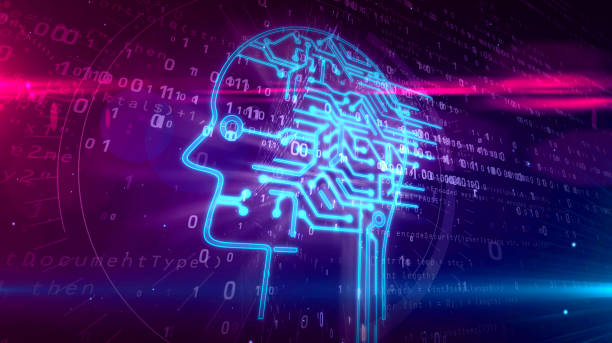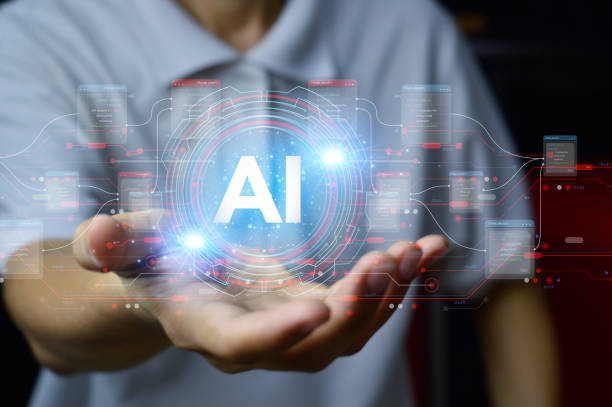What is Artificial Intelligence and How Does it Work?

Artificial intelligence (AI) is a branch of computer science that deals with creating machines that can perform tasks that usually require human intelligence.
These tasks include learning, problem-solving, pattern recognition, understanding natural language, and decision-making.
#ArtificialIntelligence strives to develop systems that can think and act like humans, but using algorithms and mathematical models.
The basis of artificial intelligence is algorithms and data.
Algorithms are a set of instructions that tell the computer how to perform a specific task.
Data is information that the computer uses to learn and improve its performance.
There are different types of artificial intelligence algorithms, including machine learning algorithms, neural networks, and evolutionary algorithms.
Each of these algorithms is suitable for solving specific problems.
Machine learning is one of the most important subsets of artificial intelligence.
In machine learning, machines learn from data without being explicitly programmed.
This process involves feeding a large amount of data into the machine and allowing it to find patterns and relationships in the data.
Then, the machine can use these patterns to make predictions or decisions about new data.
Artificial intelligence on Wikipedia
Neural networks are models inspired by the structure of the human brain.
These networks consist of interconnected nodes that process information.
Neural networks are very suitable for solving complex problems such as image recognition and natural language processing.
For example, image recognition, speech recognition, and natural language processing.
Did you know that 94% of first impressions of a company are related to its website design?
Rasaweb helps you create the best first impression by providing professional corporate website design services.
✅ Create a professional and reliable image of your brand
✅ Attract potential customers more easily and improve online position
⚡ Get free corporate website design consultation
Types of Artificial Intelligence: A Look at Different Levels
![]()
Artificial intelligence can be divided into different types based on their abilities and capabilities.
One of the most common classifications is the division into three main categories
- Narrow AI: This type of artificial intelligence can perform a specific task well.
Most of the artificial intelligence systems that are used today fall into this category.
Examples of narrow artificial intelligence include facial recognition systems, product recommendation systems, and machine translation systems. - General AI: This type of artificial intelligence can do anything that a human can do.
General artificial intelligence is still in the early stages of development and is not yet widely available. - Super AI: This type of artificial intelligence goes beyond human intelligence and can solve problems that humans are not able to solve.
Super artificial intelligence is still a theoretical concept and does not exist in reality.
In addition, artificial intelligence can be divided into other types based on how it learns, including supervised learning, unsupervised learning, and reinforcement learning.
Each of these methods is suitable for specific problems.
For example, in supervised learning, the machine is trained using labeled data.
In unsupervised learning, the machine is trained using unlabeled data.
In reinforcement learning, the machine is trained by trial and error and receiving rewards or penalties.
Choosing the right type of artificial intelligence depends on the problem you want to solve.
Narrow artificial intelligence is suitable for specific problems that require high accuracy and speed.
General artificial intelligence is suitable for problems that require flexibility and creativity.
Super artificial intelligence is suitable for problems that require solving complex and difficult problems.
Applications of Artificial Intelligence in Everyday Life

Artificial intelligence is increasingly penetrating our daily lives and has widespread applications in various industries.
Here are some common applications of artificial intelligence in everyday life
- Voice Assistants: Voice assistants like Siri, Alexa, and Google Assistant use artificial intelligence to understand and respond to voice commands.
These assistants can help you do things like set alarms, play music, send messages, and search for information. - Product Recommenders: Many e-commerce websites use artificial intelligence to suggest products that you may be interested in.
By analyzing your purchase history and behavior on the website, these systems suggest products that you are more likely to buy. - Machine Translation: Machine translation systems such as Google Translate use artificial intelligence to translate text from one language to another.
These systems can help you communicate with people who speak other languages. - Facial Recognition: Facial recognition systems use artificial intelligence to identify people’s faces in images and videos.
These systems are used in applications such as unlocking smartphones, security systems, and social networks. - Self-Driving Cars: Self-driving cars use artificial intelligence to drive without human intervention.
These cars use sensors and cameras to understand their surroundings and make decisions using artificial intelligence algorithms.
These are just a few examples of the applications of artificial intelligence in everyday life.
As technology advances, artificial intelligence is expected to play an increasingly important role in our lives.
| Application | Description |
|---|---|
| Voice Assistants | Siri, Alexa, Google Assistant |
| Product Recommenders | E-commerce Websites |
| Machine Translation | Google Translate |
| Facial Recognition | Unlocking Smartphones, Security Systems |
| Self-Driving Cars | Driving without Human Intervention |
The Impact of Artificial Intelligence on Jobs and the Labor Market

Artificial intelligence has widespread impacts on jobs and the labor market.
On the one hand, artificial intelligence can create new jobs by automating repetitive tasks and increasing productivity.
On the other hand, artificial intelligence can cause job losses by replacing human labor in some jobs.
Studies show that artificial intelligence could affect millions of jobs in the near future.
Some jobs, such as manufacturing and office jobs, are more at risk of automation.
In contrast, jobs that require human skills, such as creative and managerial jobs, are less at risk.
To prepare for the changes caused by artificial intelligence, people need to learn new skills and adapt to new technologies.
Education plays an important role in preparing people for the future job market.
Governments and organizations should also adopt policies that protect the workforce from the negative effects of artificial intelligence.
In short, artificial intelligence creates opportunities and challenges for jobs and the labor market.
By properly managing these changes, we can benefit from the advantages of artificial intelligence and prevent its negative effects.
Artificial intelligence can lead to automation and increased productivity.
Changing Nature of Jobs: With the rise of artificial intelligence, the nature of many jobs is changing.
Some jobs are completely automated, while others require new skills.
Are you disappointed with the low conversion rate of your online store?
Rasaweb is your definitive solution with professional e-commerce website design!
✅ Increase your sales and revenue
✅ Unparalleled user experience for your customers
⚡ Get a free consultation right now!
Ethical Challenges and Concerns of Artificial Intelligence

Despite its many benefits, artificial intelligence (AI) also brings with it several ethical challenges and concerns.
Some of the most important of these challenges are
- Discrimination: Artificial intelligence algorithms can be discriminatory if the data they are trained on is discriminatory.
This can lead to unfair decisions in areas such as hiring, lending, and criminal justice. - Privacy: Artificial intelligence systems can collect and process large amounts of personal data.
This can lead to violations of people’s privacy. - Accountability: When an artificial intelligence system makes a mistake, it is difficult to determine who is responsible.
This can lead to a lack of accountability and a lack of transparency. - Security: Artificial intelligence systems can be attacked by hackers and used for malicious purposes.
- Social Impacts: Artificial intelligence can have profound impacts on society, including job losses and increased inequality.
To address these challenges, laws and regulations must be put in place to regulate the use of artificial intelligence.
Also, we must ensure that artificial intelligence algorithms are fair and transparent and do not violate people’s privacy.
Artificial intelligence can create new challenges in the field of ethics.
In addition, people must be educated on how to use artificial intelligence responsibly.
By working together, we can benefit from the advantages of artificial intelligence and prevent its negative effects.
The Future of Artificial Intelligence: Prospects Ahead

The future of artificial intelligence looks very bright and promising.
As technology advances, artificial intelligence is becoming a powerful force that can improve our lives.
In the future, artificial intelligence is expected to play an increasingly important role in areas such as healthcare, education, transportation, and manufacturing.
In the field of healthcare, artificial intelligence can be used to diagnose diseases, develop new drugs, and provide personalized healthcare.
In the field of education, artificial intelligence can be used to provide customized education and help students learn better.
In the field of transportation, artificial intelligence can be used to develop self-driving cars and improve the safety and efficiency of transportation systems.
In the field of manufacturing, artificial intelligence can be used to automate manufacturing processes and increase productivity.
Of course, to realize these visions, the ethical challenges and concerns of artificial intelligence must also be addressed.
By working together, we can benefit from the advantages of artificial intelligence and prevent its negative effects.Artificial intelligence will play an important role in the development of technology in the future.
In short, the future of artificial intelligence is full of opportunities and challenges.
By properly managing these changes, we can use artificial intelligence to build a better world.
Artificial intelligence is advancing rapidly and new applications are being discovered every day.
Machine Learning: The Key to Artificial Intelligence

Machine Learning is one of the most important subsets of artificial intelligence that allows machines to learn from data without being explicitly programmed.
Machine learning uses algorithms and mathematical models to analyze data and identify patterns.
Then, the machine can use these patterns to make predictions or decisions about new data.
There are different types of machine learning algorithms, including supervised learning, unsupervised learning, and reinforcement learning.
In supervised learning, the machine is trained using labeled data.
In unsupervised learning, the machine is trained using unlabeled data.
In reinforcement learning, the machine is trained by trial and error and receiving rewards or penalties.
Artificial intelligence is heavily dependent on machine learning.
Machine learning is used in a wide range of applications, including facial recognition, speech recognition, natural language processing, product recommenders, and self-driving cars.
As technology advances, machine learning is expected to play an increasingly important role in our lives.
| Learning Type | Description | Example |
|---|---|---|
| Supervised Learning | Using labeled data for training | Spam Email Detection |
| Unsupervised Learning | Using unlabeled data for training | Customer Clustering |
| Reinforcement Learning | Learning through trial and error and receiving rewards | Playing Games |
The Role of Data in the Development of Artificial Intelligence

Data plays a very important role in the development of artificial intelligence.
Artificial intelligence algorithms need a large amount of data to learn and improve their performance.
The more data and the more diverse, the more accurate patterns artificial intelligence algorithms can identify and make better predictions.
Data can be collected from various sources, including sensors, mobile devices, social networks, and databases.
Collecting, cleaning, and preparing data for use in artificial intelligence algorithms is a complex and time-consuming process.
Artificial intelligence is practically impossible without data.
Data quality is also very important.
Incorrect or incomplete data can lead to incorrect results and wrong decisions.
Therefore, ensuring data quality before using it in artificial intelligence algorithms is essential.
Data management and ensuring its quality is one of the main challenges in the development of artificial intelligence.
In addition, maintaining data privacy is also an important concern.
Personal data must be carefully protected and used only with people’s consent.
Governments and organizations should adopt policies that protect data privacy.
Do you have an online store but your sales are not as good as you expect? Rasaweb will solve your problem forever with professional e-commerce website design!
✅ Significant increase in conversion rate and sales
✅ Unparalleled user experience for your customers
⚡ Click to get a free consultation with Rasaweb!
Artificial Intelligence in Iran: Current Status and Prospects

Artificial intelligence in Iran is in the early stages of development, but nevertheless, many efforts are being made to develop this technology in the country.
The Iranian government has made artificial intelligence one of its top priorities and is implementing various programs to support the development of this technology.
Universities and research centers in Iran are also conducting extensive activities in the field of artificial intelligence.
Many Iranian students and researchers are studying and researching in the field of artificial intelligence.
Artificial intelligence in Iran has a high potential for growth.
Private companies are also active in the field of artificial intelligence in Iran.
These companies are active in various fields such as the development of artificial intelligence software, the provision of artificial intelligence consulting services, and artificial intelligence training.
However, the development of artificial intelligence in Iran also faces challenges.
Lack of investment, lack of specialized manpower, and lack of proper infrastructure are among these challenges.
Despite these challenges, the outlook for artificial intelligence in Iran looks bright.
By increasing investment, training specialized manpower, and creating proper infrastructure, Iran can become one of the leading countries in the field of artificial intelligence.
Iran is trying not to be left behind in the artificial intelligence race.
How to Learn Artificial Intelligence?

Learning artificial intelligence can be an exciting and challenging journey.
To get started, many resources are available that can help you learn the basics and advanced concepts of this field.
Here are some tips to get started learning artificial intelligence
- Learning the principles of mathematics and computer science: Artificial intelligence is based on mathematics and computer science.
To deeply understand the concepts of artificial intelligence, you must have sufficient knowledge in mathematics such as linear algebra, statistics and probability, and computer science such as algorithms and data structures. - Choosing a suitable programming language: Python is one of the most popular programming languages for developing artificial intelligence.
Learning Python can help you implement artificial intelligence algorithms and work with various libraries. - Reading books and articles: There are many books and articles in the field of artificial intelligence that can help you learn theoretical and practical concepts.
- Participating in online and in-person courses: There are many online and in-person courses in the field of artificial intelligence that can help you learn artificial intelligence concepts and gain practical skills.
- Doing practical projects: The best way to learn artificial intelligence is to do practical projects.
By doing practical projects, you can apply theoretical concepts in practice and improve your skills.
Artificial intelligence is a vast field and learning it requires effort and perseverance.
However, by using the right resources and doing practical exercises, you can become an artificial intelligence expert.
Frequently Asked Questions
| Question | Answer |
|---|---|
| What is artificial intelligence? | It is the simulation of human intelligence in programmed machines to think like humans and imitate their actions. |
| What are the main branches of artificial intelligence? | Includes machine learning, deep learning, natural language processing, computer vision, and robotics. |
| What is Machine Learning? | It is a branch of artificial intelligence that focuses on enabling systems to learn from data and identify patterns without explicit programming. |
| Mention examples of artificial intelligence applications in our daily lives. | Voice assistants (such as Siri and Alexa), recommendation systems in Netflix and Amazon, self-driving cars, and facial recognition programs. |
| What is Deep Learning? | It is a subset of machine learning that uses multi-layered (deep) artificial neural networks to process large amounts of data. |
| What is Natural Language Processing (NLP)? | It is a branch of artificial intelligence that focuses on enabling computers to understand, interpret, and generate human language. |
| What are some of the ethical concerns related to artificial intelligence? | Includes bias in data, privacy, job loss, and responsibility in the event of errors. |
| What are the main benefits of artificial intelligence? | Increased efficiency, improved decision-making, automation of repetitive tasks, and detection of complex patterns in data. |
| How is artificial intelligence used in the healthcare field? | In diagnosing diseases, discovering drugs, analyzing medical images, and providing personalized patient care. |
| How do you see the future of artificial intelligence? | It is expected to continue to evolve at a rapid pace, affecting all aspects of human life, from industry to education and entertainment. |
And other advertising agency services Rasaweb in the field of advertising
Smart social media: A creative platform to improve SEO ranking by optimizing key pages.
Smart Marketplace: An exclusive service for online growth based on SEO-oriented content strategy.
Smart direct marketing: Transform digital branding with the help of SEO-oriented content strategy.
Smart conversion rate optimization: An exclusive service to improve SEO ranking based on the use of real data.
Smart brand identity: Designed for businesses that are looking to increase site visits by optimizing key pages.
And more than hundreds of other services in the field of internet advertising, advertising consulting and organizational solutions
Internet advertising | Advertising strategy | Reportage ad
Resources
Artificial Intelligence: Advantages, Disadvantages and Concerns – BBC News Persian
,Functions of Smart System in Isna Daily
,Future of Artificial Intelligence: Key Trends and Impacts – Tekra
,Two Developments of Artificial Intelligence in Iran for Beneficiary Home and Known Solution – IRNA
? Are you ready for your business to shine in the digital world? Rasaweb Digital Marketing Agency Aferin, by offering comprehensive solutions from fast website design and professional to SEO and content marketing, helps you to achieve your goals. With us, experience a powerful and influential presence online.
📍 Tehran, Mirdamad Street, next to the Central Bank, Kazerun South Alley, Ramin Alley No. 6




